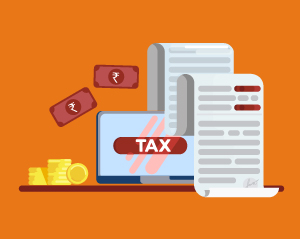Section 80C - Deductions of investment from taxable income
Some of your investments give you more than just expected returns. You can also save on tax. Section 80C investments are an important examples of such investments. This deduction is eligible for an individual and a Hindu Undivided Family (HUF). The deductions are available in some of the major investments, such as:
- Investment in Public Provident Fund (PPF)
- Unit Linked Investment Plans (ULIPs)
- Equity Linked Savings Schemes (ELSS)
- Employee’s share of Provident Fund contribution
- National Saving Certificates (NSC)
- Life insurance premium payment
- Children’s tuition fee
- Principal repayment of home loan
- Senior Citizens Savings Scheme(SCSS)
Maximum Deduction: `1,50,000*
*The maximum deduction provided here is for the particular section only. Please also note that, cumulatively, the maximum deduction that can be claimed under Section 80C, Section 80CC and 80CCD(1) is `1,50,000. Above this, an additional `50,000 can be claimed as a tax deduction for investment in National Pension Scheme (NPS) account under Section 80CCD(1B)
Section 80CCC - Deduction of contribution to pension fund
It is designed to reduce the income tax liability on the pension plans offered by various public and private sector insurers. It provides a deduction to an individual who has paid or deposited an amount in any annuity plan of an insurer for receiving a pension (income) from a fund set up by an insurer. Deduction of premium paid during the year can be claimed as deduction from taxable income.
Maximum Deduction: `1,50,000*
*The maximum deduction provided here is for the particular section only.Also, please note that, cumulatively, the maximum deduction that can be claimed under Section 80C, Section 80CC and 80CCD(1) is `1,50,000. Above this, an additional `50,000 can be claimed as a tax deduction for investment in NPS account under Section 80CCD(1B)
Section 80CCD - Deduction of contribution to pension scheme of central government
Deduction under Section 80CCD is allowed to an individual who makes deposits to his/her pension account.The maximum deduction is allowed to 10% of the salary (in the case of salaried individuals) and 20% of gross total income (in the case of self-employed individuals) or `1,50,000- whichever is less. Under Sub-section1B, an additional deduction of upto `50,0000 is available for contributions towards NPS by individuals.
Maximum Deduction: `2,00,000*
*The maximum deduction provided here is for the particular section only. Please also note that, cumulatively, the maximum deduction that can be claimed under Section 80C, Section 80CC and 80CCD(1) is `1,50,000. Above this, an additional `50,000 can be claimed as a tax deduction for investment in NPS account under Section 80CCD(1B)
Both the sections mentioned above are tied with pension plans and annuity plans. But there is a difference between the two. While Section 80CCC covers the deduction for the amount paid towards the annuity plan of any insurer, Section 80CCD provides a deduction for the amount contributed to pension schemes : NPS and Atal Pension Yojana.
Section 80D - Deduction of premium paid for medical insurance
Under section 80D, deduction of up to `25,000 is allowed to a tax-payer for insurance of self, spouse and dependent children. In case the age of the insured is 60 years or more, then the deduction is available up to `30,000. An additional deduction of insurance for parents (father or mother, or for both) is allowed to the extent of `25,000 (`30,000 if parents are of age 60 years or more). One can also avail a deduction for preventive health check-up of up to `5,000 under the prescribed limit as above.
Maximum Deduction: `60,000
Section 80DD – Deduction for Medical Treatment of a Dependent with Disability
Section 80DD offers deductions for resident individuals and HUFs who incur expenses for the medical treatment, nursing care, training, and rehabilitation of a dependent relative with a disability.
The deduction varies based on the level of disability. For dependents with a normal disability you can claim a deduction of up to ₹ 75,000. If the dependent has a severe disability the deduction increases to ₹ 1,25,000.
Section 80DDB – Deduction for Medical Treatment
Section 80 deductions also include Section 80DDB, which provides deductions for resident individuals and HUFs for medical treatments incurred for themselves or their dependents. The value of the deduction is decided as per the age of the taxpayer:
- For individuals under 60 years of age, the deduction is capped at the lower of the amount paid or ₹ 40,000
- For individuals aged 60 and above, the limit increases to ₹ 1,00,000, again based on the lower of the amount paid or the specified limit
It is important to note that you need a prescription for medical treatment from the concerned medical specialist to claim this deduction. Moreover, if you claim insurance from an insurance company or your employer, the deductible amount will be reduced accordingly.
Section 80E - Deduction of interest paid on education loan taken for higher studies
If you have taken an education loan for pursuing higher studies, then you can claim tax deduction under Section 80E. It is applicable even when the loan may have been taken for the spouse, children or for a student for whom the taxpayer is a legal guardian. The deduction is allowed on the interest amount of the loan and is available for a maximum of 8 years or till the interest is paid, whichever is earlier. You can even claim the deduction under this if the loan is taken for financing foreign studies.
Maximum Deduction: No restriction. The deduction allowed for 8 years.
Section 80GG - Tax deductions on house rent paid
Under Section 80GG, you can claim a deduction for the house rent paid when House Rent Allowance(HRA) is not received in salary. The taxpayer, spouse or the minor child mustn’t own residential accommodation at the place of the employment. The taxpayer should be living on rent and paying the rent. Also, the taxpayer should not have any self-occupied residential property in any other place.
The deduction under this section is available to the minimum of:
- Rent paid minus 10% of the total income
- `5,000 per month
- 25% of total income
Maximum Deduction: `60,000
Other Deductions in Section 80
Section 80TTA – Interest on Savings Accounts
Under Section 80TTA, a deduction can be claimed against interest income gained from a savings bank account. Interest from a savings bank account should be first included under the head ‘other income’ while computing it and deduction can be availed of the total interest earned or ₹ 10,000 whichever is less. The interest income from fixed deposits, recurring deposits, or interest income from corporate bonds, cannot be claimed under this section.
Section 80TTB – Interest from Deposits Held by Senior Citizens
Section 80TTB allows resident senior citizens aged 60 years and above to claim a deduction on interest earned from deposits during a financial year. The maximum deduction allowed under this section is ₹ 50,000.
Section 80EEA – Interest on Home Loan For First-Time Home Owners
Section 80EEA offers additional tax benefits to individuals paying interest on home loans for purchasing or constructing affordable housing. Taxpayers can claim a deduction of up to ₹ 1.5 lakh per financial year on the interest paid for home loans taken between April 1, 2019 and March 31, 2022.
However, you must meet the following conditions to qualify for this tax deduction:
- You must not own a residential property on the date of loan sanction
- The stamp duty value of the property should be less than ₹ 45 lakh
Section 80EE- Interest on Home Loan For First-Time Home Owners
Section 80EE provides deductions specifically for first-time homebuyers. The home loan must have been sanctioned during the financial year 2016-17 in order to claim this deduction.
The eligibility criteria include owning only one residential property on the date of loan sanction. Additionally, the property value should be less than ₹ 50 lakh and the home loan amount should be capped at ₹ 35 lakh.
Section 80EEB - Interest paid on Electric Vehicle Loan
Under Section 80EEB, taxpayers can claim a deduction on the interest paid for a loan taken to purchase an electric vehicle. The maximum deduction available under this section is ₹ 1.5 lakh.
Section 80U – Deduction for Disabled Individuals
Section 80U offers a deduction to resident individuals suffering from physical disabilities, such as blindness or mental retardation. The amount deductible under the section is capped at ₹ 75,000 for normal disabilities and ₹ 1,25,000 for severe disabilities
Section 80G – Income Tax Benefits Towards Donations for Social Causes
Section 80 of the Income Tax Act, 1961 allows taxpayers to claim a tax deduction on donations of either 100% or 50% under Section 80G. Here’s how this works:
1. Donations eligible for 100% deduction without any qualifying limit:
- National Defence Fund set up by the Central Government
- Prime Minister’s National Relief Fund
- National Foundation for Communal Harmony
- An approved university/educational institution of National eminence
- Zila Saksharta Samiti constituted in any district under the chairmanship of the Collector of that district
- Fund set up by a state government for medical relief to the poor
- National Illness Assistance Fund
- National Blood Transfusion Council or any State Blood Transfusion Council
- National Trust for Welfare of Persons with Autism, Cerebral Palsy, Mental Retardation, and Multiple Disabilities
- National Sports Fund
- National Cultural Fund
- Fund for Technology Development and Application
- National Children’s Fund
- Chief Minister’s Relief Fund or Lieutenant Governor’s Relief Fund with respect to any State or Union Territory
- The Army Central Welfare Fund or the Indian Naval Benevolent Fund or the Air Force Central Welfare Fund, Andhra Pradesh Chief Minister’s Cyclone Relief Fund, 1996
- The Maharashtra Chief Minister’s Relief Fund during October 1, 1993, and October 6, 1993
- Chief Minister’s Earthquake Relief Fund, Maharashtra
- Any fund set up by the State Government of Gujarat exclusively for providing relief to the victims of the earthquake in Gujarat
- Any trust, institution or fund to which Section 80G(5C) applies for providing relief to the victims of the earthquake in Gujarat (contribution made between January 26, 2001, and September 30, 2001)
- Prime Minister’s Armenia Earthquake Relief Fund
- Africa (Public Contributions – India) Fund
- Swachh Bharat Kosh (applicable from FY 2014-15)
- Clean Ganga Fund (applicable from FY 2014-15)
- National Fund for Control of Drug Abuse (applicable from FY 2015-16)
2. Donations eligible for a 50% deduction without any qualifying limit:
- Jawaharlal Nehru Memorial Fund*
- Prime Minister’s Drought Relief Fund
- Indira Gandhi Memorial Trust*
- The Rajiv Gandhi Foundation*
*It is important to note that donations to the above foundations will not be available after April 1, 2024.
3. Donations eligible for 100% deduction subject to 10% of adjusted gross total income:
- Donations to promote family planning
- Donations by companies to the Indian Olympic Association for Sports Development
4. Donations eligible for 50% deduction subject to 10% of adjusted gross total income:
- Government or local authority for charitable purposes, excluding family planning
- Donations to institutions dealing with housing accommodation needs
- Repairs or renovations of notified places of worship
It is important to note that from FY 2017-18 onwards, cash donations exceeding ₹ 2,000 are not eligible for deductions and donations must be made through non-cash methods if you wish to claim a deduction under Section 80G.
Section 80GGB – Company Donation to Political Parties
Section 80GGB allows Indian companies to claim a deduction for contributions made to political parties or electoral trusts. This deduction applies only to donations made through modes other than cash, such as bank transfers, cheque payments and others.
Section 80GGC – Deduction on Donations by a Person to Political Parties
Section 80GGC provides deductions for individual taxpayers donating to political parties or electoral trusts. However, to avail of this deduction, payments must be made through non-cash methods, just like Section 80GGB.
It is important to note that companies, local authorities, and government-funded entities are not eligible for this deduction but can still claim a tax deduction under Section 80GGB.
Section 80RRB – Deduction on Income via Royalty of a Patent
You can also claim a deduction under Section 80 on royalties. Section 80RRB offers deductions for individual taxpayers receiving royalty income from patents registered on or after April 1 2003, under The Patents Act, 1970. The maximum deduction allowed is ₹ 3 lakh or the actual income received, whichever is lower. To claim this deduction, the taxpayer must be an individual patentee and an Indian resident. You also need to provide a certificate signed by the prescribed authority.
Section 80QQB – Deduction on Royalty Income of Authors
Indian authors earning royalty or copyright income can claim a deduction of up to ₹ 3 lakh or the actual income received, whichever is less, under Section 80QQB.
COMP/DOC/Jan/2025/21/8059


Comp/doc/Oct/2017/0463
People like you also read ...







